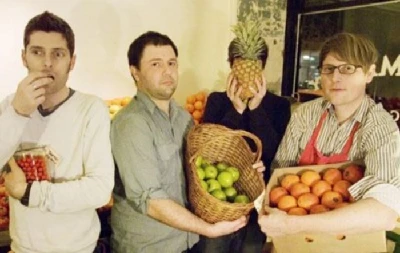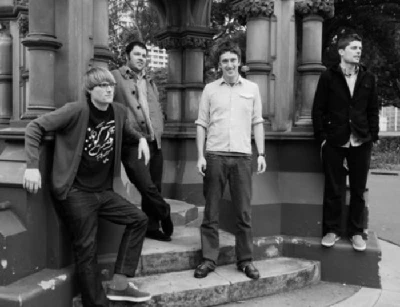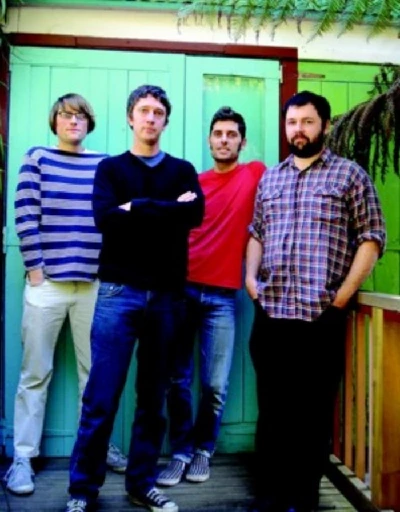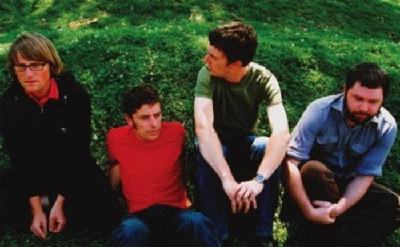published: 28 /
7 /
2009
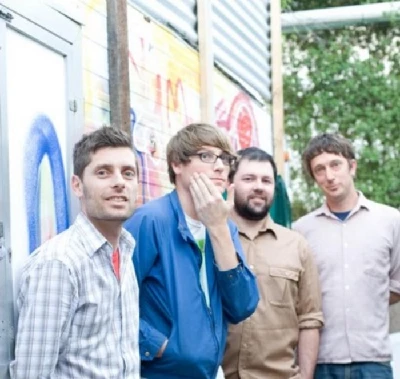
Australian indie pop group, the Lucksmiths, have recently announced their decision to split. Ben Howarth speaks to guitarist Marty Donald and bassist Mark Monnone at one of their farewell London shows about their band's long musical history and why they have decided to break up
Article
Some things you never miss until they are taken away. I’m standing three rows from the front at the Luminaire, on Kilburn High Road in North London, watching the Lucksmiths - a four piece band from Melbourne, Australia as they play the first of two ‘farewell’ concerts in the UK. They will split up at the end of the month, after a tour of Australia.
And I’m thinking, "Christ, they’re good… don’t break up!"
Of course, I’d always known they were good - I’ve given them a series of positive reviews for this website. I first heard them in 2001, when I splurged on albums from their US label Matinee in preparation for an interview with label boss Jimmy Tassos.
Since then, the band has released a string of singles and four albums, almost all of which I bought as soon as they were released. Their final album (their tenth, in total) ‘First Frost’ was released last year. Their most intricate and varied release, its muted tone might not have seemed as anthemic as their career-defining 2005 release ‘Warmer Corners’, but it confirmed that their were no musical reasons for the band to call it a day.
Their set this evening ranged from recent work to crowd pleasing favourites from the late 1990s. Though the band has expanded to a four piece (having added guitarist Louis Richter to its line-up), and in my eyes, significantly improved since those earlier days, certain strong characteristics endured in all their songs - most obviously the endearing tunes.
All four members of the band wrote songs towards the end of the band. Indeed, singer and drummer Tali White fronts his own band the Guild League. But the core of the band’s songwriting has come from bassist Mark Monnone (whose basslines have tended to add sparkle to the simple arrangements devised by the band) and rhythm guitarist Marty Donald.
Monnone’s songs tend to be more light-hearted (for example, he penned the summer day anthem T-Shirt Weather, a longstanding crowd pleaser), although songs such as ‘Don’t Bring Your Work To Bed’ show a touch of melancholy on occasions. Donald’s, meanwhile, are characterised by droll wit, subtle rhymes and canny wordplay.
Two hours before taking the stage, having completed a delayed sound check after being kept hanging around for a long delay in Madrid before their eventual flight into London, I sat down for an interview with the songwriting duo. You'll notice, I suspect, that their answers match their songwriting style, with Marty Donald the more serious of the two and Mark Monnone more likely to throw in a tongue-in-cheek one liner.
PB: I’ll begin with perhaps the most awkward question, that is the fact that the band is set to break-up.
MM: (Interrupts) We’re not talking about the band breaking up! So what else is going on?!
MD: We actually haven’t had to talk about it at all yet - because we’re not touring Australia until August we haven’t given any interviews. We’ve fumbled our way through most of the questions about the band breaking up. So, I don’t know.
PB: It’s okay if you don’t want to talk about it…
MD: It was more of culmination rather than for any specific reason, just a combination of things that had been building up. The band takes a lot of time, and it was becoming more of an effort. We had reached a realisation that we didn’t want the band to start suffering because we weren’t able to give it everything.
PB: Do you know what you will be doing after that last tour?
MD: We haven’t really had time to sit down and talk about it. I guess that ever since the decision was made we have been pretty flat out.
MM: We were still in the middle of organising this European tour when we decided about it, and we still had a lot of work to do on that. So we’ve pretty much just worked through.
MD: It’s also one of those things that you want to think about. It’s something that you want to work through in your own mind over time.
MM: We didn’t want our side-projects getting in the way!
PB: Are you expecting to carry on with music, though?
MM: Most definitely. I don’t know about you, Marty?
MD: Yeah, yeah. I have thought about other things that I would like to do. I’ve been telling myself for many years that I should try and write a book or something, so I might do that too. But I can’t imagine not writing songs and not playing music. I’ve been doing it for so long.
PB: But, I imagine, possibly on a different scale.
MM: We all have other things that we do musically as well. Sometimes we all have a lot going on, and other times not so much. But I really don’t get people that say they’d stop entirely.
But, on the question of breaking up, I can only really relate it to how it would be with a family. We have spent so much time together, it would be a like a family moving apart and not seeing each other so often. I’m sure we will still see each other, and possibly bust out a few blues jams from time to time.
PB: Moving on to, hopefully, more happy subjects. Now that the band is coming to an end, what have been your favourite moments?
MD: I think I most enjoyed recording the last album. That was a really special time. We managed to make it through eight solid days with only each other and the producer for company, and had such a fantastic time making that album. We stayed together in a really beautiful spot out in Tasmania, and it was a really great location, a great time.
Also, it sounds really cheesy, but through all the touring that we’ve done, the nicest bit has been all the friends that we have made over the time we’ve been in the band. Last night, we played in Madrid and some really good friends of ours from America had been in the Netherlands and drove all night to make the show. That’s the kind of thing we’ll remember - we’ve known all those guys for such a long time now.
And touring itself as well. It might sound trite, but it is true. I’ll always remember driving into New York for the first time, seeing the city skyline for the first time. Those were the kind of things that, when we started the band, we really never thought we would do.
MM: Hey, please don’t forget waiting for hours and hours at Madrid airport! Being ripped off for our buffet breakfast…
MD: Oh yeah, that was definitely a highlight, right there today.
PB: What has been your favourite album, or - given that you’ve done so many singles and EPs - your favourite release?
MM: Oh, of ours?
PB: Yep, only your own count!
MM: Well, I always think that the ‘Staring at the Sky’ record (6 track EP, Matinee Records, 1999 - BH) is really great. Whenever I hear that, every five or six years or so, I really enjoy it. I also really like the last album, 'First Frost', song wise and because it was so great recording it.
MD: I think I always like ‘Warmer Corners’, when that came out it was the most happy I’d felt. I tend to listen to our records very critically, looking for the things that I wish I could change, and that album has the fewest of those things on it. Also, in terms of my own songs, I think that has a few of my best ones on it. But, generally, I think we have tended to improve with every release.
PB: ‘Warmer Corners’ did seem to be a shift for the band. It seemed like the point that you went from being very popular within a small and well-set part of the music scene, to getting more attention from the general indie scene, with websites like Pitchforkmedia suddenly being very positive.
MM: And all of a sudden, grandmas were listening to us, everyone was listening to us, we were a household name… (laughs, and pauses)... Well, we’ve never made a conscious decision to be stuck in a niche or a particular style. I suppose that kind of thing really depends on how many promotional copies of each release have been sent out. We’re on some great labels, but they certainly don’t have millions of dollars to spend on promos, so I think a lot of the question of success comes down to that. Maybe Sean Price from Fortuna Pop (the owner of the Lucksmiths' UK label of the last few years-BH)had a couple of extra copies and he was able to sling them over to some mainstream press. I don’t know!
MD: I think the other aspect that coincided with that was that this had been the first record where Louis was part of the band. He was involved throughout the recording. It changed the way we sounded… I don’t want it to sound negative about what we did in the past, but it made us sound… (Pauses)
PB: It was a fuller sound…
MD: Yeah, a fuller and probably more accessible sound for people.
MM: Less unique! It made us sound less unique… we just sounded like every band with a bitching guitarist! Joking aside, I think Louis did perhaps smooth over a few of the quirks a bit.
PB: But not too much! That takes me on to the question of song writing. You shared this out amongst the band, but mostly with the pair of you taking on the bulk of the song writing. Did you feel, ever, that there was a distinct Lucksmiths-style that you were obliged to work towards?
MM: I think earlier on we were a bit more adventurous. Perhaps we were trying to take something from each of our influences. But, I don’t know for sure. Maybe we got more comfortable with a certain way of approaching songs.
MD: I think in terms of how I approached writing my own songs, I worked out the right way of approaching the way I was writing. It might have taken many years, and I’m not sure if I have completely figured it out, but I have got a sense of what I wanted to do as a songwriter.
In our earlier years, I was happy to write a throw-away song or do one that sounded a bit jazzy, all kinds of stuff. But, although some might see having your own kind of sound as a handicap, in that it can be a constraint, I see it as a luxury that we were around long enough to work out exactly what we wanted to do with it.
Also, not many of the bands that I like are the sort that are reinventing themselves constantly. There are plenty of bands that have been putting out records that are true to their own sound for a long time, so there’s definitely something to be said for that.
PB: Once you had written a song, were you essentially bringing it to the band and saying, "this is how it goes, this is how it sounds", or were you changing it a lot once the others had got their hands on it.
MD: It really depends on the song, it really changed a lot. It also depends on the person as well. I think as Mark is a more competent musician than myself. He tended to have more of the parts worked out fully. My songs would mostly come with guitar chords, and a few vague ideas for tunes.
But it varied enormously, I guess we tended to work on the arrangements on a very collaborative basis. It was never dictatorial, and we all really enjoy the process. Working on a new song, when we had the time to devote to it, was my favourite aspect to being in the band - watching a song take shape.
MM: Definitely - I think we would all agree with that. I think each of us is able to give something to each other’s songs, and recently having Louis in the band has been a great luxury. It has gotten us closer to the sound we wanted and made us more dynamic.
PB: You mentioned earlier that you were able to record ‘First Frost’ in one go, over an eight day period. Do you think that was why you enjoyed it more, that it gave you a chance to make that collaborative process more complete?
MD: I think the main difference is that we were away and spent the whole time together. In the past, at least for the last few albums, they had always been recorded in one go, but we’d always been in Melbourne and had gone home at night. The difference for ‘First Frost’ was that we were under each other’s noses the whole time, and that allowed us to focus completely on what we wanted to achieve.
MM: We had that once before. On ‘Staring At The Sky’ we were together in a really small apartment in Paris, and, when we did that, it somehow helped the songs come together.
PB: One aspect to the Lucksmiths that I haven’t really seen in many other bands, especially those that I have spoken to in the past, was that you recorded for lots of different labels, and tended to give songs to compilations and do lots of singles as well. Were there certain songs that you consciously held back to be parts of an album, or did you just record things and use them as and when they were wanted.
MD: I think, over time, we became a bit more protective. In the early days, we were a bit more prolific, but we also didn’t really have a long term plan. When someone asked us for a song, we would just give them whatever the most recent song was.
But, even now, it’s a hard thing to do. I think, speaking about my own songs, there are some that I haven’t had very high expectations for when I wrote them, but then they have turned out to be my favourite sounding. That’s not always been the case, but you don’t want to second guess yourself too much.
PB: That’s meant, though, that there have been - as well as the studio albums - three compilation albums.
MD: We’ve done plenty of that sort of stuff. We’re still quite touched when people approach us to do a song for something, and if we have the time, or the song, then we will do it.
PB: The third compilation, ‘Spring A Leak’ reflected that. It seemed to mop up everything that you’d done over time, songs which hadn’t made the main albums.
MM: We hadn’t realised how much work it would be. We thought we’d get all the cover versions that we had done, put them together and have a CDR that we could sell on tour. Then, we gradually found more and more - "wahey, look at all this other crap".
MD: Mark and I started to listen through the left over recordings we had, and kept finding more and more recordings, like lots of live things that we’d forgotten ever existed. It ended up being a much larger undertaking and a lot more work on our behalf. The idea had been, when we knew after ‘Warmer Corners’ that we wouldn’t be able to put a record out for quite a while, that this wouldn’t be too much work. We hadn’t really realised how much of an undertaking ‘Spring a Leak’ would be.
PB: And from all that recording, you’ve worked with lots of different labels, including Candle, Matinee, Drive-In and Fortuna Pop.
MD: They’re all friends, primarily. Jimmy at Matinee and Sean over here at Fortuna Pop are certainly good friends more than anything else, and working with them all has been very easy> There have certainly not been many issues.
PB: And you’ve tended to handle things such as artwork yourselves…
MD: We’ve always just done everything ourselves as much as we possibly could, to save money as well.
MM: We’ve sometimes, when we’ve been in the middle of something, used other people, but I think when you’ve become very close to something it’s good to take ownership of it in every way you can.
MD: I suppose it just makes things easier. I suppose with sleeves, putting lyrics on, I would rather trust myself or Mark to do that, than have someone else do it and have to read it over six times checking for typos.
MM: We’re kind of annoying guys to hang around with!
PB: Moving on, with this being your final tour, are you doing anything particular with the setlist? I suppose that, now you’re entering the final leg, this a question for Pennyblackmusic’s massive Australian readership!
MD: We started working a while ago to re-learn some of the older songs, we won’t be able to do everything, but we’re hoping for an overview from every release. It's actually been really fun, listening back to some of the songs that we haven’t played live for ages. We did a similar thing when we played our tenth anniversary show a few years back, and I remember that being a lot of work, but this time the songs seemed to come together really easily. So yeah, we’re looking forward to it.
PB: Once that Australian tour ends, are you assuming that will be it completely. Or would you consider maybe playing the odd show sometime in the future.
MD: Um, I don’t know. Its all ended on amicable terms, so I don’t want to say never, but I’d be surprised. I don’t really see the point, I suppose, I’d like to leave it as it is. We’re certainly never going to get back together for the money, so I can’t really foresee a situation where that would really achieve anything.
PB: Time for the final question! If you looked back to 1993, when you made ‘The First Tape’, and then jumped forward to now, what do you think your impressions would be.
MD: Well, I think very good. We’re in a restaurant in London, doing an interview.
MM: Don’t go crazy, it’s a kebab joint!!
MD: I don’t think we ever had great expectations or a long term plan for the band. We just did whatever seemed like a good idea, so anything we have achieved along the way has been somewhat startling. Having people on the other side of the world singing along to our songs has been more than we ever could have expected.
MM: And now we’re damned sick of it…
PB: That, then, seems like an ideal time to stop bothering you, and say thanks for your time!
Picture Gallery:-
